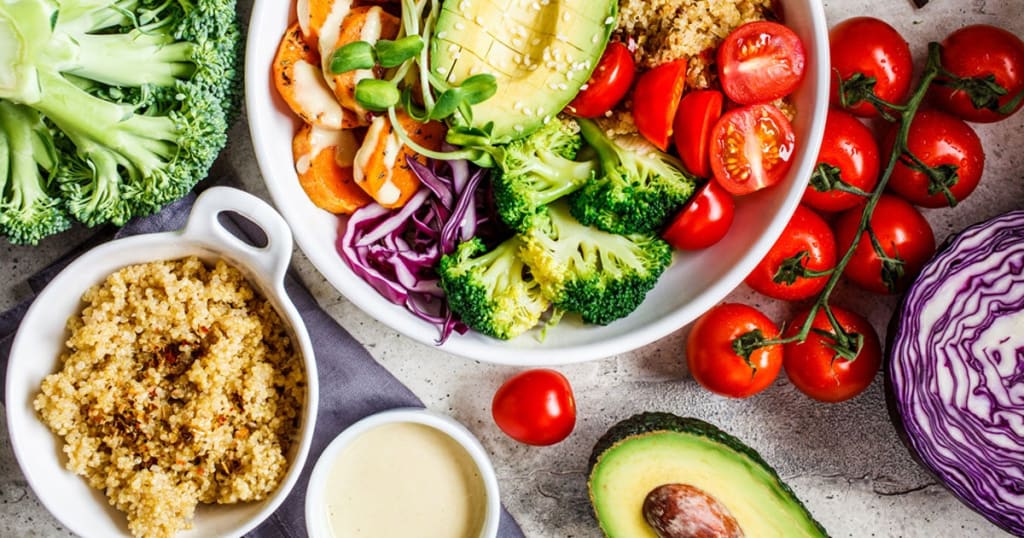
Maintaining a healthy diet is essential for overall well-being. Here are some tips and tricks to help you establish and sustain a healthy eating plan:
1. Plan your meals: Create a weekly meal plan, including breakfast, lunch, dinner, and snacks. This will help you make healthier choices and avoid impulsive, unhealthy meals.
2. Include a variety of food groups: Ensure that your diet consists of fruits, vegetables, whole grains, lean proteins, and healthy fats. Each food group provides essential nutrients necessary for good health.
3. Portion control: Be mindful of your portion sizes. Use smaller plates and bowls to help control the amount of food you eat. Listen to your body's hunger and fullness cues, and avoid overeating.
4. Stay hydrated: Drink an adequate amount of water throughout the day. Water helps with digestion, nutrient absorption, and overall body function. Avoid sugary beverages and excessive consumption of alcohol.
5. Limit processed foods: Processed foods tend to be high in added sugars, unhealthy fats, and sodium. Opt for whole, unprocessed foods as much as possible, such as fresh fruits and vegetables, lean meats, and whole grains.
6. Cook meals at home: When you prepare your meals, you have control over the ingredients and cooking methods used. This allows you to make healthier choices and avoid hidden unhealthy additives.
7. Read food labels: Pay attention to the nutrition labels on packaged foods. Look for products that are low in added sugars, unhealthy fats, and sodium. Choose foods with higher fiber content and essential vitamins and minerals.
8. Limit added sugars and salt: Reduce your intake of foods and drinks that contain high amounts of added sugars and salt. These can contribute to various health issues, including obesity, diabetes, and high blood pressure.
9. Snack smartly: Choose nutritious snacks such as fruits, vegetables, nuts, and yogurt instead of sugary or processed snacks. Keep healthy snacks readily available to avoid reaching for unhealthy options.
10. Practice mindful eating: Slow down and savor your meals. Pay attention to the flavors, textures, and smells of the food you eat. This helps you enjoy your food more and recognize when you're satisfied, preventing overeating.
11. Limit eating out and takeaways: Restaurant and takeaway meals often contain higher levels of unhealthy fats, sugars, and sodium. Prepare meals at home whenever possible to have better control over ingredients and portion sizes.
12. Seek professional advice if needed: If you have specific dietary concerns or health conditions, it's advisable to consult a registered dietitian or nutritionist. They can provide personalized guidance and support based on your individual needs.
13. Eat a Rainbow of Fruits and Vegetables: Aim to include a variety of colorful fruits and vegetables in your diet. Different colors indicate different nutrients, so consuming a range of colors ensures you get a broad spectrum of vitamins, minerals, and antioxidants.
14. Choose Whole Grains: Opt for whole grain products like whole wheat bread, brown rice, quinoa, and oats. Whole grains provide more fiber, vitamins, and minerals compared to refined grains.
15. Include Healthy Fats: Include sources of healthy fats in your diet, such as avocados, nuts, seeds, and olive oil. These fats are important for brain function, hormone production, and overall health. However, remember to consume them in moderation, as they are high in calories.
16. Prioritize Lean Proteins: Include lean protein sources like poultry, fish, tofu, legumes, and low-fat dairy products in your meals. Protein is essential for building and repairing tissues, and it helps keep you feeling full and satisfied.
17. Minimize Added Sugars: Reduce your consumption of foods and beverages with added sugars, such as sodas, candies, baked goods, and sugary cereals. Instead, satisfy your sweet tooth with naturally sweet options like fresh fruit.
18. Control Salt Intake: High sodium intake can contribute to high blood pressure and other health problems. Limit your consumption of processed and packaged foods, as they often contain excessive amounts of sodium. Instead, flavor your dishes with herbs, spices, and other seasonings.
19. Be Mindful of Portion Sizes: Pay attention to portion sizes to avoid overeating. Use smaller plates and bowls to help control portions. Remember, it's not just about what you eat but also how much you eat.
20. Cook at Home: Cooking your meals at home gives you more control over the ingredients and cooking methods used. Experiment with healthy recipes, try new ingredients, and enjoy the process of preparing nourishing meals.
21. Practice Moderation: It's okay to indulge in your favorite treats occasionally, but moderation is key. Enjoy them in smaller portions and less frequently. Balance indulgences with nutrient-dense foods in your overall diet.
22. Listen to Your Body: Learn to recognize your body's hunger and fullness cues. Eat when you're hungry and stop eating when you're satisfied, but not overly full. This helps maintain a healthy relationship with food.
23. Stay Active: Regular physical activity complements a healthy diet. Aim for at least 150 minutes of moderate-intensity exercise or 75 minutes of vigorous exercise each week. Find activities you enjoy to make exercise a regular part of your routine.
24. Get Adequate Sleep: Quality sleep is crucial for overall health, including maintaining a healthy diet. Lack of sleep can affect hunger hormones, leading to increased appetite and cravings. Strive for 7-9 hours of quality sleep each night.
Remember, adopting a healthy diet is a long-term commitment. Small, sustainable changes over time can lead to significant improvements in your overall health and well-being.





Comments
There are no comments for this story
Be the first to respond and start the conversation.